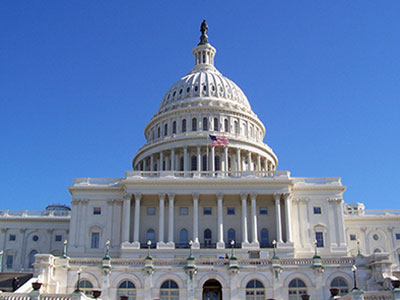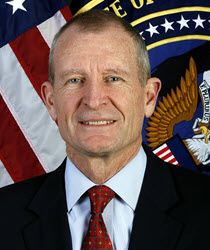Testimony
Evaluating CFIUS
Challenges Posed by a Changing Global Economy
On January 9, Admiral Dennis C. Blair testified at a public hearing before the House Financial Services Committee on “Evaluating CFIUS: Challenges Posed by a Changing Global Economy.”
Admiral Blair, former Director of National Intelligence, is co-chair of the Commission on the Theft of American Intellectual Property (IP Commission), which released the IP Commission Report and 2017 update. The IP Commission was supported by unrestricted funding provided by NBR and its Slade Gorton International Policy Center.
The House Committee announcement describes the hearing as follows:
This hearing will examine the history, operations and any operational challenges of the multi-agency panel known as the Committee on Foreign Investment in the United States (“CFIUS”). CFIUS examines proposed investment in the United States to identify, and if possible, mitigate any threat to national security, or recommend to the President he use his authority to reject the proposal. The hearing will provide the Subcommittee with information about CFIUS’s effectiveness, any challenges it faces in the current economic environment and potential improvements that could be made to increase its effectiveness.
View the hearing webcast on the Financial Services Committee website: Hearings: “Evaluating CFIUS: Challenges Posed by a Changing Global Economy.”
Read Admiral Blair’s prepared statement below or access the PDF here.
Testimony before the House Committee on Financial Services
Subcommittee on Monetary Policy and Trade
United States House of Representatives
Hearing: “Evaluating CFIUS: Challenges Posed by a Changing Global Economy”
Testimony by:
Dennis C. Blair
Co-chair, The Commission on the Theft of American Intellectual Property
January 9, 2018
2128 Rayburn House Office Building
I. Introduction
Chairman Barr, Ranking Member Moore, and members of the Committee, thank you for the opportunity to testify on this important matter.
My recommendations in the testimony are based on my work as co-chair of the Commission on the Theft of American Intellectual Property (IP Commission), and on my observations of the behavior of this country’s economic and security competitors since the end of the Cold War. While this hearing is primarily concerned with how the Committee on Foreign Investment in the United States (CFIUS) process might usefully be reformed, I encourage members and committee staff to review the findings of both the original IP Commission report and the 2017 update for additional details on the scale and scope of the IP theft problem. We have brought copies of those reports today.
II. CFIUS Reform
The bill to reform CFIUS currently under consideration by this committee is welcome. In the ten years since CFIUS was last updated, there have been many developments. We have learned a great deal about how other countries and their companies are able to take advantage of the American economy while working actively against American interests in other areas.
The Foreign Investment Risk Review Modernization Act (FIRRMA) is a welcome and necessary update to the current CFIUS statute. It recognizes that majority ownership of a U.S. company is not the only way that foreign countries gain access to cutting edge U.S. technology with potential military applications. It widens the categories of “covered transactions” to include deals short of full ownership that would enable the loss of militarily relevant technology of a U.S. company. One of its most important features is the updating and expanding of the specific factors that CFIUS may consider when analyzing a transaction’s national security implications. For example, it adds the following as a specific factor: “Whether the transaction involves a country of special concern that has a demonstrated or declared the strategic goal of acquiring a type of critical technology that a U.S. business that is a party to the transaction possesses.”
Chinese investors are now involved in up to 10% of all American venture deals, and especially in startups in areas such as AI, autonomous vehicles, augmented/virtual reality, robotics, and blockchain technology, all important to American military effectiveness in the future. The CFIUS process needs to cover these transactions and these areas to ensure that we preserve the American edge.
Beyond the important considerations of preserving our advantage in military technology, I recommend that the CFIUS process be expanded to punish foreign companies for actions that have already damaged our economic and national security. By punishing past damaging behavior, we can prevent future harm by those companies and deter damaging behavior by other companies. I would add to the CFIUS process the following principle: If a foreign company has stolen American intellectual property, or has taken actions against American security policies or interests, it should not be allowed to invest in this country – it should not be allowed to purchase ownership of American companies.
This principle would widen the current military security focus of the CFIUS process. Over the decades CFIUS has addressed many different risks of foreign investment in this country, from petrodollar investment from countries in the Middle East to Japanese investment in American companies and real estate in the 1980s. These investments did not pose immediate military risks to the United States, but they had the potential to pose economic risks. In the long term, our national security depends on our economic vibrancy and growth. CFIUS should be the means by which the United States controls foreign investment that causes risks to the country, whether they are financial, commercial or military.
III. Foreign Investment Risks
Foreign companies, predominately Chinese companies, with the encouragement of official Chinese policy and often the active participation of government personnel, have been pillaging the intellectual property of American companies. This is a significantly new environment from the one that existed when CFIUS was last reformed ten years ago. In an updated report last year by the IP Commission, which Ambassador Jon Huntsman and I originally co-chaired, and which I now co-chair with Craig Barrett, we found that all together, IP theft costs the United States up to $600 billion a year, which is more than the total U.S. trade deficit with Asia. China accounts for most of that loss.
Deficiencies in China’s IP rights regime have gone uncorrected, with cyber theft and forced data transfers being particularly harmful. China singles out high-tech sectors in its five-year plans, increasing pressure on Chinese firms to procure the technologies necessary to reach or surpass global competitors, in some cases using Chinese government-controlled entities to illegally acquire the intellectual property. Affected sectors include electronics, telecommunications, robotics, data services, pharmaceuticals, mobile phone services, satellite communications and imagery, and business application software.
The United States urgently needs a comprehensive program to deal with this hemorrhage of its competitive advantage, and our Commission report lists the many elements of such a program. However, at a minimum, Chinese and other foreign companies that have stolen American intellectual property should not be allowed to invest in this country. We need to face these companies with a choice – either follow American intellectual property rights law or do no business in the United States. The CFIUS process should be a part of imposing this choice.
Chinese companies like Sinovel, one of the world’s largest producers of wind turbines, should be stopped from investing in U.S. companies, based on Sinovel’s theft of intellectual property from American Superconductor (AMSC). Chinese companies that manufacture solar panels like Trina Solar and JA Solar, two of the top builders and installers of solar panels in the world, with subsidiaries in the United States, and both of which have used IP stolen from the American company SolarWorld, should not be allowed to invest in this country. Companies like the huge Jiangsu Shinri Machinery Company, which stole intellectual property from its joint venture partner Fellowes, should not be allowed to invest in the United States.
There are many ways beyond IP theft that foreign companies, sometimes acting on their own, sometimes compelled or induced by their own governments, have harmed American security interests. They have undercut American sanctions against authoritarian regimes that oppress their own people, supported terrorist groups or contributed to the development of nuclear weapons. Most of these foreign companies do not invest in the United States where they would be subject to CFIUS review, and there are other ways under American law of dealing with them, especially denial of their access to the American banking system. However, it is not clear to me, for example, whether we have kept a list of the Dutch, German and French companies that supplied the AQ Kahn-led Pakistani nuclear development program, and whether we use that information in the CFIUS process. I would guess not. We should develop a list of companies like this, their current structures, related parent and partner companies, and ensure they are not able to invest here.
Major international companies that have harmed American security interests have been able to purchase American companies. For example, the primary Chinese company that built up seven features in the South China Sea into potential military bases is a subsidiary of the China Communications Construction Company, known by its initials CCCC. In August 2010, another subsidiary of CCCC purchased an American company that is the world’s leading designer of offshore drilling rigs, the Houston-based company Friede Goldman United, or F&G. We should face CCCC, one of the top international construction companies in the world, with a choice: either cooperate with the Chinese government against American interests or invest in the United States. You can’t have it both ways.
To give another Chinese example. It was China Oilfield Services Limited (COSL), a subsidiary of the Chinese energy giant China National Offshore Oil Corporation, or CNOOC, that deployed drilling rig HD 981 into disputed waters in the South China Sea in May 2014 and provoked a confrontation with Vietnam. CNOOC is no stranger to the CFIUS process, having been denied permission to purchase UNOCAL in 2005. CNOOC should not be allowed to purchase American companies or raise funds in the United States so long as it serves as a partner with the Chinese government in aggressive actions against American interests.
IV. CFIUS Capacity
Those in the U.S. government who work every day on CFIUS reviews in my observation are knowledgeable, dedicated, and effective. However even under the current statute, they are straining to meet the tight deadlines of a CFIUS application review with in-depth research. If the Congress expands the CFIUS standard in the direction I recommend, it will take more government officials to do the work. It will take additional staff with different skills. Lawyers and part-time military analysts currently do most of the work within the government to staff CFIUS decisions. We need to add officials with business backgrounds, especially in finance and M&A. We need to take advantage of private, independent business analysts who follow specific industries in microscopic details. We need to exchange information with organizations in Europe and Japan that have unique insights into their foreign competitors. We need to build up fresh databases tracking the activities of foreign companies so that we can quickly identify those that have engaged in harmful activity in the past. Those databases need to include the very complicated ownership structures of foreign companies, in many cases specifically designed to hide subsidiaries that are harming American interests. If we are serious about this national security threat, we would establish an organization like the National Counterterrorism Center, or NCTC, with a combination of full-time staff and personnel detailed from other government departments and agencies – a true center of expertise on the activities and structure of foreign companies taking actions and posing risks hostile to American interests.
V. Summary of Recommendations
Let me summarize the three major areas in which I believe the CFIUS legislation can be strengthened:
1. Approve the provisions of FIRRMA to update the CFIUS statute to deal with the new threats to our military technology from foreign investments.
2. Broaden the criteria for review to include whether acquiring companies have damaged or threatened U.S. national security or the national security of U.S. treaty allies through the illegal acquisition of American intellectual property, or other activities against American security polices and interests.
3. Review acquisitions that have been previously approved when new evidence comes to light of damaging actions by the foreign companies.
4. Increase staffing to support CFIUS decisions, and expand the exchange of information with the private sector and with our allies.
VI. Conclusion
The scale and scope of the theft of American intellectual property and of other actions by foreign companies against our interests demand robust policy responses that fundamentally change the cost-benefit calculus of foreign companies. Reforming the CFIUS process to include an IP protections evaluation—both before and after acquisition of American firms—and then staffing the CFIUS interagency team with sufficient resources to conduct this more thorough review are important next steps. I look forward to your questions.




